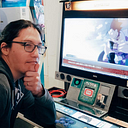Catching hands and taking notes
[This essay was funded by my generous Patreon supporters. If you liked this and want to see more, please consider joining the crew!]
Fighting games are hard as hell. When we talk about “getting better at fighting games”, the task at hand isn’t just knowing a thing, nor is it just doing a thing. Getting better at fighting games is getting your brain to know when to do the thing just in time.
Your eyes and ears are taking in information about the game state and sending them to your brain, which processes a response and sends that response to your hands to execute an input. That input then changes the game state and starts the process all over again. It’s a complicated cognitive and physical process that other kinds of games don’t stress nearly as heavily, which is why nothing else hits quite like they do.
So while much of the fighting game grind will involve lots of training mode practice and playing with people, we don’t often talk about the study and reflection that happens in-between play sessions. It’s important work! When you’re in the middle of a session you’re probably too focused on the games you’re playing to find the time and space to pick apart a complicated problem and tackle it from a different angle.
You need a tool that will let you capture the things you’re thinking about during a game and let you take it home for further analysis. Fortunately, you have that tool, and you’re probably reading this essay on it — it’s your phone, and if you’re not using it to take notes about your fighting game play, you should be.
My current note-taking app is Google Keep, mostly because it’s convenient on Android, but in the past I’ve used Google Docs, Evernote, the iOS Notes app, and even just plain old pen and paper. I don’t really go in on making them look pretty, either, but for some folks that’s an integral part of the studying process.
Of course, there is no One True Way to take notes — this is your brain you’re leveling up, and the things you do for your brain are going to be different than the things I do for mine. But I went through the last year or so of my notes to give you some ideas for ways to use notes to level up more efficiency.
Some examples:
- After you lose a set, write down the reason you think you lost. If you don’t have a video of the set, those post-match notes will be your best resource for identifying the next thing you should work on. If you do have a video of the set, watch it and compare your replay review to your initial post-match thoughts to see what the difference is between the things you notice while playing a match and the things you notice while watching it — that gap is important to recognize, too.
- Per-character matchup notes can be very useful, especially if you’re getting into a new fighting game and haven’t quite built up automatic knowledge of the whole cast yet. At first, it can be enough to just take note of specific moves or situations (overheads, unblockables, common frame trap setups), but eventually you’ll want to have a set of character-specific things you’re looking for in offense/defense/neutral situations, and working that out in notes beforehand can save you from having to remember them on the fly in a tournament match.
- Observe how other players play. If they’re playing your character, take notes on the tools they use and the decisions they make and how they’re different from yours. If you’re about to play against them, pay attention to how they spend resources, how they defend, and how aggressively they contest and steal turns. Being able to get that read on a player before you play them can be a big advantage.
- When you’re trying to work your way through a complicated problem or thought, writing your thoughts out in your notes can be a useful way to process it all. You don’t have to just use a boring text doc, either — flow charts, lists, mind maps, doodles, and photos can all be useful tools for this. For example, before tournaments sometimes I’ll write down lists of all my Chipp mixups in various different situations. Not only is this useful review, it helps me check to see if I’ve been overusing certain setups because I’ve been working on them lately.
- Ever play a match and realize the thing that got you killed was the same thing that has gotten you killed in a dozen other matches? Everyone has a couple bad habits that are hard to shake without consistent, disciplined practice, and sometimes all you need is a Post-It note reminding you what they are. I like this example from Chipp senpai Bears, who pins his list at the top of his Twitter feed:
Above all: Don’t worry about whether you’re taking the “right notes” or not! Just write down the things you think are notable and move on. Your notes are there to give your brain a little extra space, not to produce some perfect record of everything important in the game you’re playing. As you go further in your FG journey, your notes will look different because you’ll be thinking about different things; my notes from prepping for Tension Pulse focused on matchup details, but when I got close to Evo I was mostly thinking about general decision-making patterns.
Sometimes you might even find that you don’t need to look at your notes too often to get value out of taking them. For me, just taking a thought and putting it into words is often enough for me to remember the thing and move on.
— -
Thanks for reading!
💪😎👍❤
-patrick miller
